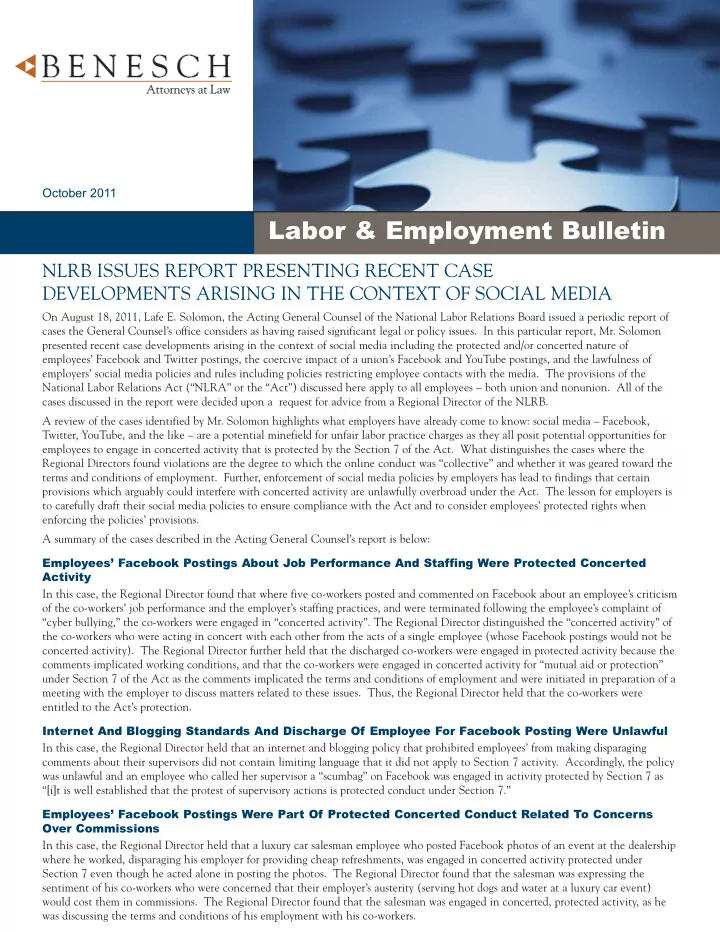

October 201 1 Labor & Employment Bulletin NLRB ISSUES REPORT PRESENTING RECENT CASE DEVELOPMENTS ARISING IN THE CONTEXT OF SOCIAL MEDIA On August 18, 2011, Lafe E. Solomon, the Acting General Counsel of the National Labor Relations Board issued a periodic report of cases the General Counsel’s office considers as having raised significant legal or policy issues. In this particular report, Mr. Solomon presented recent case developments arising in the context of social media including the protected and/or concerted nature of employees’ Facebook and Twitter postings, the coercive impact of a union’s Facebook and YouTube postings, and the lawfulness of employers’ social media policies and rules including policies restricting employee contacts with the media. The provisions of the National Labor Relations Act (“NLRA” or the “Act”) discussed here apply to all employees – both union and nonunion. All of the cases discussed in the report were decided upon a request for advice from a Regional Director of the NLRB. A review of the cases identified by Mr. Solomon highlights what employers have already come to know: social media – Facebook, Twitter, YouTube, and the like – are a potential minefield for unfair labor practice charges as they all posit potential opportunities for employees to engage in concerted activity that is protected by the Section 7 of the Act. What distinguishes the cases where the Regional Directors found violations are the degree to which the online conduct was “collective” and whether it was geared toward the terms and conditions of employment. Further, enforcement of social media policies by employers has lead to findings that certain provisions which arguably could interfere with concerted activity are unlawfully overbroad under the Act. The lesson for employers is to carefully draft their social media policies to ensure compliance with the Act and to consider employees’ protected rights when enforcing the policies’ provisions. A summary of the cases described in the Acting General Counsel’s report is below: Employees’ Facebook Postings About Job Performance And Staffing Were Protected Concerted Activity In this case, the Regional Director found that where five co-workers posted and commented on Facebook about an employee’s criticism of the co-workers’ job performance and the employer’s staffing practices, and were terminated following the employee’s complaint of “cyber bullying,” the co-workers were engaged in “concerted activity”. The Regional Director distinguished the “concerted activity” of the co-workers who were acting in concert with each other from the acts of a single employee (whose Facebook postings would not be concerted activity). The Regional Director further held that the discharged co-workers were engaged in protected activity because the comments implicated working conditions, and that the co-workers were engaged in concerted activity for “mutual aid or protection” under Section 7 of the Act as the comments implicated the terms and conditions of employment and were initiated in preparation of a meeting with the employer to discuss matters related to these issues. Thus, the Regional Director held that the co-workers were entitled to the Act’s protection. Internet And Blogging Standards And Discharge Of Employee For Facebook Posting Were Unlawful In this case, the Regional Director held that an internet and blogging policy that prohibited employees’ from making disparaging comments about their supervisors did not contain limiting language that it did not apply to Section 7 activity. Accordingly, the policy was unlawful and an employee who called her supervisor a “scumbag” on Facebook was engaged in activity protected by Section 7 as “[i]t is well established that the protest of supervisory actions is protected conduct under Section 7.” Employees’ Facebook Postings Were Part Of Protected Concerted Conduct Related To Concerns Over Commissions In this case, the Regional Director held that a luxury car salesman employee who posted Facebook photos of an event at the dealership where he worked, disparaging his employer for providing cheap refreshments, was engaged in concerted activity protected under Section 7 even though he acted alone in posting the photos. The Regional Director found that the salesman was expressing the sentiment of his co-workers who were concerned that their employer’s austerity (serving hot dogs and water at a luxury car event) would cost them in commissions. The Regional Director found that the salesman was engaged in concerted, protected activity, as he was discussing the terms and conditions of his employment with his co-workers.
Recommend
More recommend